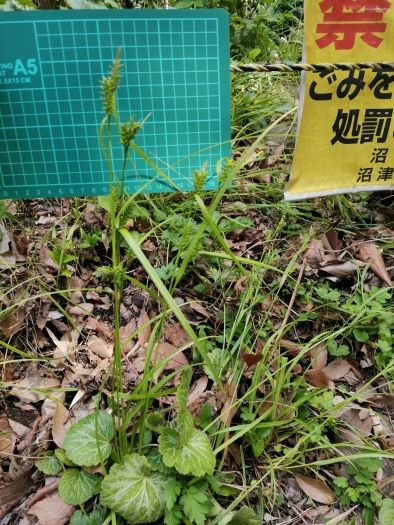Brown’s Sedge
(Carex brownii)
Brown’s Sedge (Carex brownii)
/
/

harum.koh
CC BY-SA 4.0
Image By:
harum.koh
Recorded By:
Copyright:
CC BY-SA 4.0
Copyright Notice:
Photo by: harum.koh | License Type: CC BY-SA 4.0 | License URL: http://creativecommons.org/licenses/by-sa/4.0/ | Rights Holder: harum.koh | Publisher: iNaturalist | Date Created: 2021-05-04T15:23:03-07:00 |


Estimated Native Range
Summary
Carex brownii, commonly known as Brown’s Sedge or Fowler’s Sedge, is a perennial herbaceous plant native to moist, open woodlands, meadows, and along stream banks in North America. It typically grows at a moderate rate to a height of 1.5-2.5 feet (0.46-0.8 meters) and a width of 1-1.5 feet (0.3-0.5 meters). Brown’s Sedge has a clumping growth form with narrow, grass-like leaves. The green, inconspicuous flowers bloom in the spring and are followed by small, brown seed capsules that may add textural interest in a garden setting.
Brown’s Sedge is valued for its ability to thrive in moist conditions and its fine-textured foliage that provides a naturalistic look in garden designs. It is often used in rain gardens, as a ground cover, and for erosion control along waterways. This sedge is relatively low-maintenance, requiring medium amounts of water and tolerating a range of soil types, from loam to clay, as long as they have medium drainage. It prefers full sun to part shade and is generally free from serious pests and diseases. However, it can be sensitive to drought and may require additional watering during prolonged dry periods. Brown’s Sedge is not known for being invasive and is a beneficial addition to native plant gardens, supporting local ecosystems.CC BY-SA 4.0
Brown’s Sedge is valued for its ability to thrive in moist conditions and its fine-textured foliage that provides a naturalistic look in garden designs. It is often used in rain gardens, as a ground cover, and for erosion control along waterways. This sedge is relatively low-maintenance, requiring medium amounts of water and tolerating a range of soil types, from loam to clay, as long as they have medium drainage. It prefers full sun to part shade and is generally free from serious pests and diseases. However, it can be sensitive to drought and may require additional watering during prolonged dry periods. Brown’s Sedge is not known for being invasive and is a beneficial addition to native plant gardens, supporting local ecosystems.CC BY-SA 4.0
Plant Description
- Plant Type: Grass
- Height: 1.5-2.5 feet
- Width: 1-1.5 feet
- Growth Rate: Moderate
- Flower Color: N/A
- Flowering Season: Spring
- Leaf Retention: Evergreen
Growth Requirements
- Sun: Full Sun, Part Shade
- Water: Medium
- Drainage: Medium
Common Uses
Bird Garden, Deer Resistant, Erosion Control, Low Maintenance, Water Garden
Natural Habitat
Moist, open woodlands, meadows, and stream banks
Other Names
Common Names: Fowler’s Sedge
Scientific Names: , Carex brownii, Carex striata, Vignea striata,
GBIF Accepted Name: